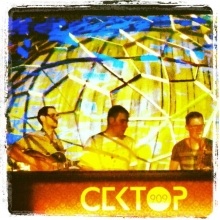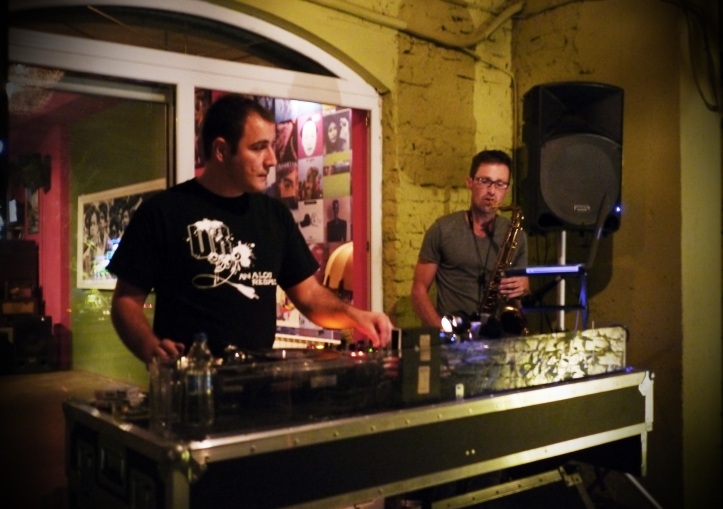 [This post was originally published in Ethnomusicology Review. See this link for the original article.] In planning my fieldwork trip this summer, I decided to focus my research on the “ethno-band” scene in Macedonia, and hoped to spend a lot of time with musicians who are continuing folk music traditions in contemporary contexts. Upon my arrival in June, I began contacting the musicians I know in that scene as well as friends who are active jazz musicians in Skopje, Macedonia’s capital city. With my tenor saxophone in tow, I quickly began meeting with jazz musicians and playing with them (mostly at local jazz hot spot Menada) while the “ethno-band” musicians seemed to be busy traveling to different festivals and working on various projects. Within the first few weeks of the trip, I began to wonder whether Macedonia had plans for me beyond what I had imagined. One of my frequent jazz collaborators and dearest friends, guitarist Georgi Sareski, had been telling me about his endeavors in electronic music with various DJs and hip hop artists through his network of friends at Club Sektor 909 and Izlet Café (both owned or part-owned by a close friend, Ogi). Georgi called me one day and asked if I’d be interested in playing saxophone with him and a house DJ friend of his, Maci, at Sektor. I had met Maci (pronounced MAH-tsee, short for Marjan) on another gig I had played with Georgi, and found him affable, fun-loving, and genuinely caring for those around him. I hoped that his choice in music would reflect the same. We ran through of some songs at Georgi’s apartment—Maci had his laptop and played a few songs from his current playlist and Georgi and I noodled around to find our place in the music. I liked Maci’s aesthetic sensibilities and felt out his sense of musical space that lent itself to an additional instrumental voice. I assumed that, like most Macedonian DJs, Maci would show up to the club with some CDs, a USB drive, or his laptop and play his songs through the club sound system. To my pleasant surprise, he arrived with two turntables and his laptop running industry standard DJ software. Alternating between spinning vinyl and using the turntables to manipulate his digital tracks, Maci put together a dynamic three-hour set of house music, continually engaging the crowd at Sektor as Georgi and I alternately and simultaneously played along to accentuate the flow of momentum Maci was creating in the club. As a musician, some collaborations seem to just work, while others can seem forced. Sometimes it has to do with musical taste, sometimes it has to do with technical ability, and sometimes it has to do with personality. Regardless of the cause (I suspect that my collaboration with Maci involved a successful combination all of those elements), Maci and I were hooked on working together after that first night. For the rest of the summer, we played together as a duo almost once a week at one of Maci’s regular nights at Sektor, Izlet, or Kala (a high-end exclusive café catering to Skopje’s elite). I got to know Maci’s current repertoire and began to discern my most effective roles in various musical moments. I learned how to recognize passages that built crowd energy through repetitive phrases, and I began to identify climactic moments suited for energetic improvisation when the often simmering tension of house music would reach a cathartic release. He would gently coach me on how he wanted me to participate in his music-making: reminding me “It’s still early” if I was playing too much at the beginning of a set, gesturing to the computer screen if a moment was coming where I’d need to let loose a little bit, or telling me “I’m going to play a 9-minute song right now where we can both take a break” when he wanted to chat or enjoy a drink. In the course of playing together, I asked Maci many questions about his career, his choice in music, and his strategies as a DJ for tailoring his music to an occasion while still expressing his own voice as an artist. Emergent in these discussions were many compelling stories and questions that I’m still thinking about. When we talked about where he finds music, Maci touched on the history of house music, referencing its birth in Chicago and how he still turns to the Chicago scene for most of his house music. He told me about the arrival of house and techno in Macedonia in the 90s and the development of an underground scene at two clubs, one in Menada’s basement and one at “MKC,” the Youth Cultural Center. He gave his perspective on vinyl versus digital music, focusing on the economic challenges common to middle class Macedonians as well as on the challenges of customs and imports in a country with no vinyl production of its own. The pathways of house and techno into Macedonia have been haphazard and dynamic, and of course are now lightning fast if you know how to create those pathways online. Maci has refined the skill of channeling these pathways, and freely performs his musical choices in Macedonia and in surrounding countries. Similar to many musicians and DJs, Maci expresses frustration (and I along with him at times), at the ways in which he has to compromise his musical selections for his audience. One night we performed at the home of a very wealthy Macedonian for a private party, and as the night wore on and the alcohol flowed, individuals began to come to us demanding songs from ex-Yugoslav 80s rock bands and American pop songs from the last year or two. Maci would smile and play the songs, but he and I both knew that we did not come with the desire to push play and simply wait for each song to pass. Ever since that specific performance with Maci, I have been asking myself many questions about the vast class disparity in Macedonia, about life in Macedonia as a professional musician in service to upper-class elites, and about dynamics of power, influence, and taste in Macedonian society. Maci, on the other hand, seems to effortlessly navigate these complicated issues with a smile on his face and continues to spin great music that creates an environment of comfort, relaxation, and enjoyment for people, regardless of the setting. When I left Macedonia a few days ago, I hung out with Maci one last time at Izlet on a Monday afternoon. Ogi came over and bought each of us a beer. We all talked about future collaborations for when I come back to Macedonia for other projects, or potentially in America where they have begun to make some connections and recently visited to spin in Detroit. In true hospitable Macedonian style, Maci drove me home (even though my apartment was only a 4-minute walk from Izlet) and gave me a jar of “slatko,” a sweet, syrupy jam, homemade by his mom from wild figs. That sugary taste will always remind me of him and the warm smiles and embraces we shared every time we met, but especially those we shared as we parted, both of us hoping for even more opportunities to collaborate in the future. I already miss him and our unexpected musical partnership, but I know the things I’ve learned from him will keep challenging both the ways I think about music and the ways I play music with others.
0 Comments
Leave a Reply. |

 RSS Feed
RSS Feed